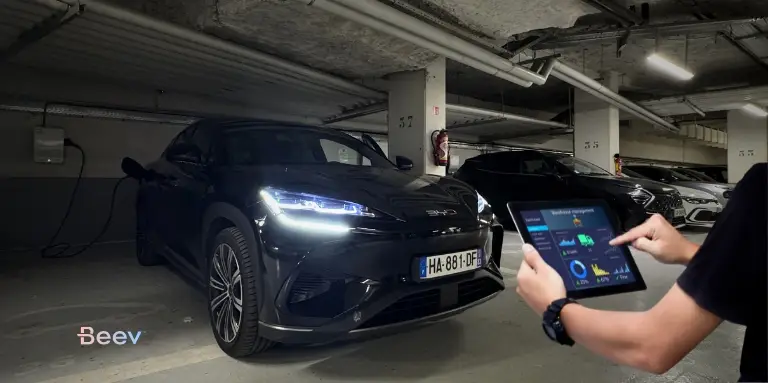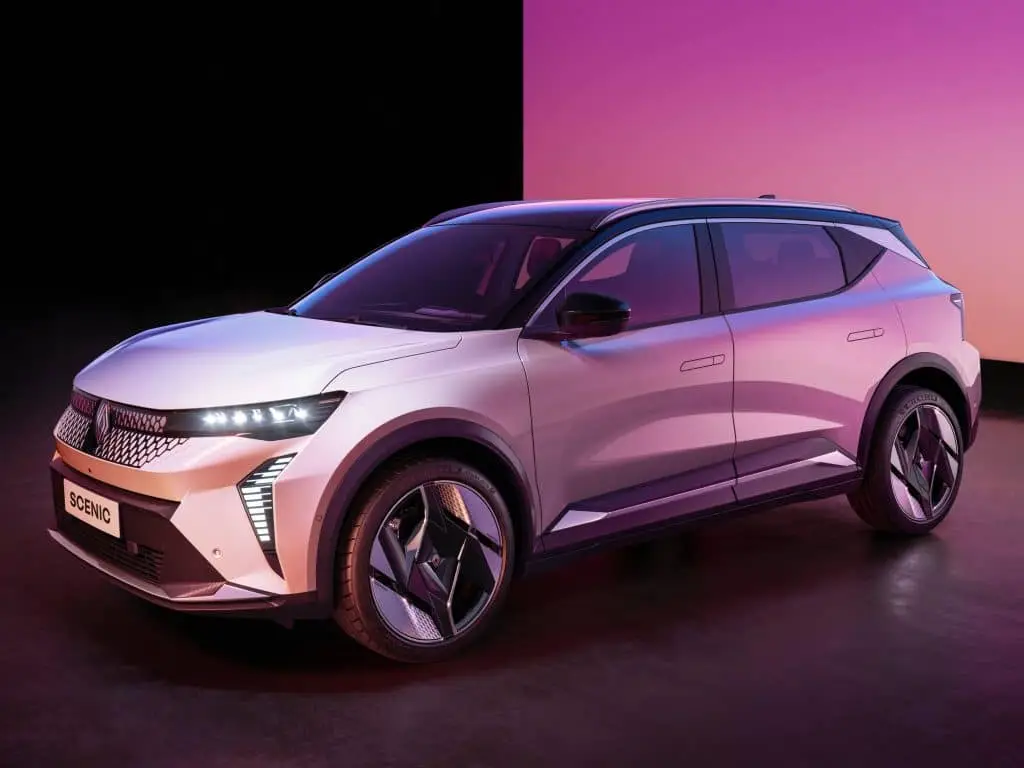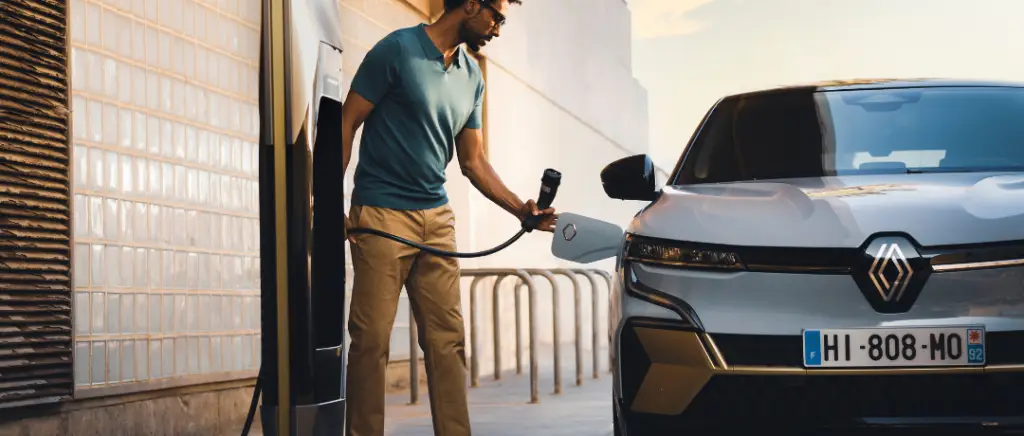Home > Electric car tax exemption for companies and the self-employed
Electric car tax exemption for companies and the self-employed
Are you planning to reduce the costs of your vehicle fleet while accelerating your ecological transition? Visit tax exemption for electric cars in 2025 opens the way to serious tax savings and new competitive levers for businesses and the liberal professions. Thanks to a rethought regulatory framework, investment in a electric car is now accompanied by major exemptions on annual taxes, unprecedented opportunities for tax optimisation ondepreciationand full recovery of VAT on recharging. Dedicated schemes also encourageinstallation of recharging stations and make it easier to manage large car fleetsall with leasing offers to adapt to the needs of all structures.
In this comprehensive guide, find out how to create your own catalogue of recharging pointsTake advantage of the new 2025 incentives, anticipate the end of certain bonuses, and secure your administrative procedures in an economic climate where every euro counts. What are the new benefits, who are they for, and how can you make the right choices for your business or self-employed practice? We'll answer all your specific questions point by point, and give you practical examples of how to turn ecological constraints into genuine tax opportunities.
Table of contents
What are the tax advantages of electric cars in 2025?
In 2025, the tax advantages for acquiring and using an electric car are particularly attractive, both for professionals and private individuals.
Firstly, electric vehicles benefit from a total exemption from Company Vehicle Tax (TVS)This means that companies that acquire an electric vehicle do not have to pay the annual taxes linked to CO₂ emissions and atmospheric pollutants. This exemption represents a significant saving, since these taxes can amount to several thousand euros a year for combustion vehicles.
Companies can also take advantage of a advantageous tax depreciationThe maximum amount that can be deducted from the purchase price has been raised to €30,000, compared with around €20,300 for a petrol or hybrid vehicle. The VAT The electricity used to recharge the car is also recoverable at 100 % for business use, further reducing the vehicle's running costs.
Although private individuals cannot reclaim VAT, they do benefit from a number of advantages: exemption from, or very substantial reduction in, the regional tax on car registration documentThese include access to local or national subsidies for the installation of charging points, and until the end of September 2025, the ecological purchase bonus (up to €4,000, depending on income). Also worth noting in terms of employee taxation, an electric vehicle used as a company car benefits from a benefit in kind halved compared with a combustion or hybrid model.
Case study :
magine a company that replaces one of its vehicles with an electric model in 2025. Right from the start, it saves on the registration fee (zero euros in most regions) and will pay no annual tax on emissions. If the acquisition cost is €36,000, it will be able to deduct €30,000 from its taxable income, thereby reducing its corporation tax.
If the vehicle is driven a lot (15,000 to 20,000 km/year), the total cost of use with full recovery of the VAT on top-ups and maintenance costs often fall below those of a comparable internal combustion vehicle after just three years.
Tax depreciation: ceiling, duration, specific features for electric vehicles
L'tax depreciation The purchase of an electric car is a major lever for companies in 2025. The principle: each year, the company deducts part of the purchase price of the car from its taxable profits, thereby reducing its tax liability. For electric vehicles, the the ceiling for deductible depreciation is set at €30,000 excluding VAT18,300 or less for conventional internal combustion models. This ceiling applies if the vehicle's CO₂ emissions are less than or equal to 20 g/km, a criterion met by all electric 100%s.
In practical terms, if a company buys an electric car for €34,000 excluding VAT, it will only be able to deduct €30,000 over 4 or 5 years: the remaining €4,000 is not tax-deductible. Depreciation is generally based on 5 yearsThis increases the benefit each year.
High specificityIf the battery is billed separately (which is the case with some brands or when a battery is hired), it is possible to have the battery charged separately.write off the battery in addition to the vehicle and sometimes over a different period: 1 year or the entire period of use, depending on the accounting strategy, without being subject to the €30,000 ceiling. This enables some companies to optimise the allocation of their expenses.
Let's take the example of a company that buys a new electric vehicle for €32,000 excluding VAT, with the price of the battery listed separately at €8,000. It can write off €30,000 on the electric vehicle over 5 years (i.e. €6,000 per year tax-deductible), then book and write off the battery on a separate account, for example over 2 years (i.e. €4,000 per year tax-deductible for the battery).
The remaining €2,000 of the price of the car over and above the €30,000 will not be deducted. This arrangement optimises the maximum tax deduction, and allows higher costs to be incurred in the first few years of operation.
Abolition of TVS and new annual taxes: what's changing in 2025
From 1 January 2025, the fiscality of vehicles The tax on vehicles used for business purposes is changing: the old TVS (Taxe sur les Véhicules de Société) has been replaced by two new annual taxes based on strict ecological criteria. From now on, companies must pay :
- an annual tax on CO₂ emissions, the amount of which depends on the vehicle's actual level of emissions and its date of first registration,
- an annual tax on atmospheric pollutants, calculated according to the vehicle's Crit'Air category and designed to penalise those that emit more particles or nitrogen oxides.
These changes toughen the tax regime for polluting vehicles, particularly hybrids (which will lose their exemption from 2025), while maintaining a total exemption for 100 % electric or hydrogen-powered vehicles.
Who can benefit from exemptions and deductions?
In 2025, access to tax exemptions and deductions for electric vehicles essentially concerns companies, whatever their sector or size, as long as they acquire or use 100 % electric vehicles as part of their professional activity. This includes :
- The VSES, SMES and large companies
- The liberal professions
- The self-employed and auto-entrepreneurs
- The rental companiestaxis, VTC, and fleet managers
The main advantages:
- Total exemption from annual taxes emissions of CO₂ and atmospheric pollutants: only electric cars benefit from this tax neutrality, while hybrids and combustion engines are now taxed according to strict scales.
- Exemption (partial or total) from regional tax on vehicle registration documents for "clean" vehicles, mainly the 100 % electric vehicles: in practical terms, for registration in 2025, the vehicle registration document will continue to be free of charge in most regions.
- 100% recoverable VAT % on the electricity consumed to charge electric vehicles, a benefit that is non-existent or very limited for fuel for combustion vehicles.
- Substantial allowance for benefits in kind for employees using an electric company vehicle (up to 70 % allowance at the beginning of 2025).
| Who can benefit? | Applicable exemptions and deductions |
|---|---|
| VSEs, SMEs, large companies | - Total exemption from annual taxes on CO₂ emissions and atmospheric pollutants - Partial or total exemption from regional vehicle registration tax - VAT recoverable at 100% on professional recharging electricity - Allowance on benefit in kind for electric company car (up to 70% at the beginning of 2025) |
| Liberal professions | - Same advantages as above: exemption from annual tax, vehicle registration, recoverable VAT, benefit in kind allowance, etc. |
| Self-employed, auto-entrepreneurs | - Same advantages as above |
| Hire companies, taxis, VTCs, fleet managers | - Same advantages as above, allowing you to optimise fleet management and the taxation of each vehicle |
Case study :
Let's take the example of an engineering company that decides to renew its service vehicles by choosing only electric cars in 2025. For each vehicle, it pays no tax on CO₂ emissions or pollutants, and the vehicle registration document is offered. If its employees use these vehicles as company cars, the benefit in kind on the payslip is greatly reduced, easing the tax burden on employees.
The company also reclaims VAT on all the electricity consumed for recharging for business use, thereby optimising both its tax position and its running costs.
Ecological bonus and conversion premium: what remains in 2025
By 2025, the environmental bonus is changing, and now only applies to the purchase or lease of new electric 100 % cars costing less than €47,000 and complying with a strict environmental score. For vehicles ordered up to 30 June 2025 (and delivered before 30 September 2025), the aid ranged from €2,000 to €4,000, depending on the household's tax income.
Since 1 July 2025, the scheme has been based on energy saving certificates (CEE)the amount granted remains between 3,100 and €4,200 for individuals, modulated according to income levels, with specific 'social leasing' for low-income households (reduced rental prices).
Most of the rechargeable hybridsHydrogen-powered cars and light commercial vehicles are no longer eligible, except for specific measures for the French Overseas Territories. Dealers will apply the bonus directly at the time of purchase, to simplify the experience. As for the conversion premiumIn 2025, it will mainly apply to bicycles and cycles, and will no longer be available for replacing an old vehicle with a new electric car.
Case study :
Let's assume that a modest household wants to buy a new electric city car for €32,000 (inc. VAT) in July 2025. They could benefit from a "helping hand" of 4 200 € under the new CEE scheme, provided you meet the income criteria and have a car that meets the price and weight ceilings.
The dealer deducts this amount directly from the price when the order is placed. For a household with a higher income, the bonus will be 3 100 €. On the other hand, if a family wants to get rid of an old diesel car and buy a new electric vehicle, the conversion bonus will no longer apply: they will just be left with the ecological bonus.
Administrative procedures: how to optimise and secure your tax exemption
For optimising and securing tax exemption of an electric car in 2025, it's crucial to follow rigorous administrative procedures from the moment you decide to buy or lease. The first step is to check the vehicle's eligibility to the various benefits: the vehicle must be new, exclusively electric, cost less than or equal to €47,000 inc. VAT (including battery), weigh less than 2,400 kg and have an environmental score in line with the requirements set by decree.
These criteria are essential to qualify for the environmental bonusIn addition, there are exemptions from registration fees and annual emissions tax.
For the eco-bonus: all you need to do is provide a tax assessment to the dealer or lessor who, in most cases, takes charge of the formalities with the energy supplier to obtain the subsidy via the energy saving certificates (CEE). The aid is then deducted directly from the invoice. In the event of an inspection, always keep your supporting documents: purchase or hire invoice, documents certifying receipt of the bonus, certificate of conformity for the vehicle.
To obtain exemption from the registration fee, you must apply online via the official government website (ANTS). As some regions are likely to revise their policies each year, it is advisable to consult the tariff and exemption in force before finalising your purchase.
Concerning the tax credit for charging pointsIf you have already paid for the system, keep the installer's invoice, which must state precisely the type of system installed, whether it can be controlled and where the work was carried out. The expense must be included in the following year's tax return.
Finally, for tax depreciation: enter the vehicle in your company's fixed assets register, subject to the maximum deductible limit of €30,000. If the battery is invoiced separately, reserve a separate fixed asset line for optimum depreciation.
Practical advice to maximise your tax advantage in 2025
For maximising your tax advantage in 2025 With an electric car, there are a number of strategies and best practices to follow.
- Choose a 100 % electric vehicle to benefit from annual tax exemption
All taxes on the allocation of business vehicles (ex-TVS, CO₂ and pollutant taxes) are completely abolished for electric cars. This choice protects you from the high rates applied to combustion or hybrid vehicles, especially as these taxes can represent thousands of euros each year. - Optimise tax depreciation
The ceiling on deductible depreciation is €30,000 excluding VAT for electric cars, so choose models with a purchase price (excluding the battery) close to this figure to maximise the deduction over several years. If the battery is invoiced separately, depreciate it over a shorter period: this option, which is specific to electric cars, allows you to spread the costs more evenly over your accounting periods. - Recover VAT on top-ups
VAT can be reclaimed by 100% on electricity used to charge business electric vehicles, both at the workplace and at public charging points, provided that each expense can be justified. This significantly reduces the cost of running the vehicle. - Take advantage of the CEE "helping hand" and regional schemes
Even if the traditional ecological bonus disappears, there is still a helping hand in the form of energy saving certificates (CEE), especially for low-income households. And don't forget to check out the grants available from local authorities for the installation of charging points or the purchase of clean vehicles. - Favour centralised management and regulatory anticipation
For fleet managers, group together all your electric investments so as to exceed the thresholds that trigger benefits (e.g. fleet of at least 100 vehicles to benefit from an additional exemption from the new incentive tax). Keep abreast of legislative developments: vehicle taxation changes quickly, and reforms can tip the profitability of a model from one financial year to the next. - Reduce the benefit in kind for employees
By 2025, the use of a electric company vehicle allows you to benefit from an allowance on thebenefit in kindThis limits the tax impact for both the employer and the beneficiary.
Example An engineering firm is renewing its fleet with ten electric cars worth €29,500 each (battery included but invoiced separately at €7,000). The firm is depreciating each vehicle for €30,000 and the full cost of each battery over three years. VAT is reclaimed on the annual recharging costs, and the vehicle registration document costs nothing thanks to local tax exemption.
None of the vehicles are subject to the new annual emissions taxes, and every employee using one of these company vehicles benefits from a benefit in kind emissions. By combining these strategies, the firm can significantly reduce its tax burden and total cost of ownership, while at the same time demonstrating its commitment to the environment.
Our latest white paper :
Resources on the taxation of electric mobility

- Charging stations, Fleet management, Electric cars

- Fleet management, magazine, Professionals, CSR, Electric vans, Electric cars

- Taxation of electric cars and charging stations, Fleet management, Electric cars
Do you have a question about fleet electrification?
Why electrify a company fleet in 2025?
Electrification makes it possible to reduce running costs (recharging, maintenance), meet regulatory requirements (LOM law, ZFE) and improve the company's CSR image. Electric vehicles also offer greater comfort for drivers.
What are the current legal obligations?
Since 1 January 2025, companies with more than 50 employees and a fleet of more than 100 vehicles must include at least 20 % of low-emission vehicles in their annual renewals. This quota will rise to 40 % in 2027 and 70 % in 2030. There are financial penalties for non-compliance.
What financial assistance is available?
Companies can benefit from subsidies such as ADEME's "Tremplin pour la transition écologique" scheme, which finances studies, diagnostics and investment in sustainable mobility.
How is Beev supporting the electric transition?
Beev offers a personalised audit of your fleet, identifies vehicle and charging infrastructure requirements, and provides a free platform to manage your electric fleet, track costs in real time and monitor CO₂ emissions.
What are the economic advantages of an electric fleet?
Electric vehicles cost around four times less to recharge than internal combustion vehicles, and require less maintenance. What's more, they save money thanks to the financial assistance available.
How do you manage an electric fleet effectively?
We recommend using management tools such as the Beev platform, which allows you to view key vehicle data, monitor the status of charging points and optimise the fleet's energy performance.

